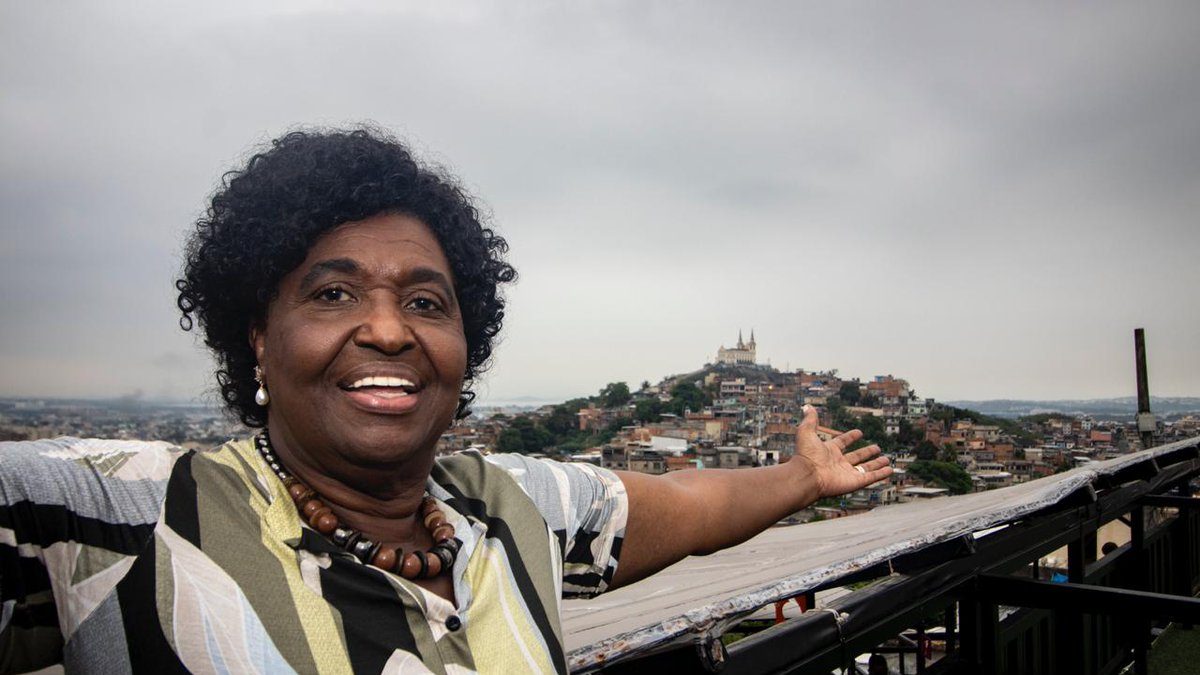The veteran congresswoman and civil rights leader speaks about her role in the 2020 municipal elections and the record number of newly elected Afro-Brazilian city councilors and mayors.
By Brian Mier
Brazil’s 2020 municipal elections were marked by huge loses for the far right, big gains for the center right and moderate gains for the left. The most positive result, however, was the large gains made by Afro-Brazilians, who make up 54% of the population at large. The fact that this happened in a climate of growing racism in Brazil is no small achievement, and one of main people who fought for this is Congresswoman Benedita da Silva from the Workers Party (Partido dos Trabalhadores/PT).
Da Silva grew up in Rio de Janeiro’s Chapeu Mangeuira favela in a family with 14 brothers and sisters and began working as a street vendor when she was still a small child. She eventually became a nurses aid, then a community association leader. In 1983 she was elected to Rio de Janeiro city council, then became the first black women ever elected Senator of the Republic and the first black woman Governor of Rio de Janeiro.
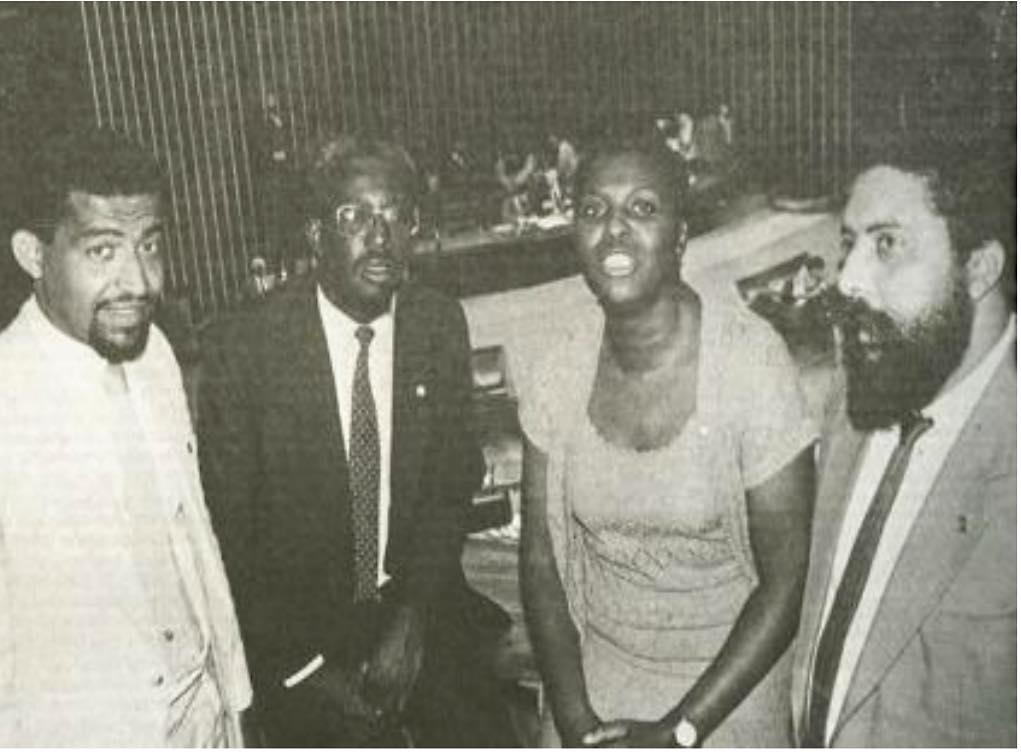
1988 – da Silva successfully fought to have racism declared a crime in Brazil’s new Federal Constitution
Over the past 40 years, da Silva has been a key actor in the civil rights movement, often working behind the scenes. In August, at age 78, she scored one of her greatest victories, representing the black movement to successfully pressure the Supreme Electoral Court to force political parties to divide campaign funding up equitably with black candidates. This was important because although there was already a law in place requiring political parties to field candidates that equitably represent the population in terms of gender and race, most parties continued to give the lions share of their campaign funding and airtime to white candidates. Immediately after the Supreme Electoral Court made its ruling, representatives of the Socialism and Freedom Party (Partido de Socialismo e Liberdade/PSOL) sucessfully filed a motion to uphold the ruling with the Supreme Court, and on the eve of campaign season, the parties were obliged to comply. The rest is history. Starting this January, 44% of all city councilors and 32% of mayors in Brazil will be Afro-Brazilian.
I caught up with Congresswoman Da Silva on Wednesday, December 16th. The following is an edited transcript of our conversation.
After decades of struggle you scored a congressional victory in 2013 with the approval of your bill which guaranteed equal labor rights for domestic workers, who previously did not have the right to a 44 hour work week and equal benefits . The bourgeois media immediately attacked you and the law. Do you think this law triggered a backlash from the middle class that may have increased racism?
No. It’s not an issue of an increase. Racism already existed. I want to make it perfectly clear that the this issue of domestic work was built on racism, on the idea that black people have to work and shouldn’t have labor rights.

2013 – Da Silva pushes through a bill granting equal rights to domestic workers. Veja warns white people they may have to start washing their own dishes
Last month, the highest number of Afro-Brazilian mayors and city councilors was elected in Brazilian history. Many people are saying that the main reason this happened is the work that you did behind the scenes pressuring the Supreme Electoral Court. Why was its ruling so important?
Because we know that structural and institutional racism exists. Also, because many black people were not running for office simply due to lack of resources – not due to lack of knowledge or qualifications or because they didn’t want to. It’s very expensive to run for office with any electoral viability in a society such as ours so this ruling was very important. First, we developed this project and tried to incorporate it into the Electoral Reform Act, but Congress didn’t accept it. At that point I appealed to the Supreme Electoral Court. It granted the right to equal campaign support for black people in proportion to their percentage in the population a large. It guaranteed this equal support from the parties in terms of TV and radio airtime and campaign financing.
Carol Dartora has just become the first Afro-Brazilian woman elected in the history of Curitiba’s City Council and now she is receiving death threats. As someone who opened the door for a generation of Afro-Brazilian politicians when Democracy returned to Brazil, starting with your days in Rio de Janeiro’s city council, could you relate some experiences you have had with racism and explain how you overcame them?
We suffer this racist violence every day. It doesn’t matter what the time period in which we run or get elected is. Racism exists and it comes out during elections, because during that time we are competing against a narrative that political representatives should be powerful, rich, white men. A woman – especially a black women – imagine that! So we break this narrative when we enter the race and when we do this they get really scared, not just that we will be elected, but of the issues we defend. We’ve seen this with Marielle Franco and many others. So I still suffer to this day. I just finished a campaign for Mayor of Rio– a beautiful, clean, ethical campaign. I consider it to have been a didactic campaign, which had the responsibility of fighting racism, creating an anti-racist society. So, this led to verbal violence against me and physical threats on the social media – a lot of violence. There were women candidates who were assassinated during this year’s election campaign period. In other words, the female body has become a threat. So now we are creating a congressional commission to establish a mechanism to protect women politicians.
Why is our city councilwoman, Carol, passing through this experience right now? It is because of the color of her skin. Because she is a black woman, she suffers a lot more. There were other women who were elected. Why aren’t they going through this kind of experience? It’s also related to the issues she campaigned on, values I share with her. We want a city that is welcoming. I don’t want a city that separates the favelas, or as they say in São Paulo, the quebradas. I want a city that is united. We are talking about people. We want citizens. And we want people coming into the city council who will enact laws that protect and include everyone. The majority of this group of everyone is black people. So it is clear that they are seeing that we are reacting politically, and this is something that is very serious. This is making them violent. In theory it’s only threats, right? But from Marielle forwards – not just from her, there were cases before her like that of Margarida Maria Alves, who was a great leader – whenever a black woman starts leading an electoral process she has to deal with a great moment of political and electoral insecurity.
The government has to take action, because the way that the court ruled on our request, guaranteeing that we receive equal financial support and airtime, is a threat to the elite families that have been in politics for the past 200 years. Even I still have to deal with this. I am still a threat to them and they become more and more sophisticated every day. Lately this violence has transformed into constant physical threats of horrible things.
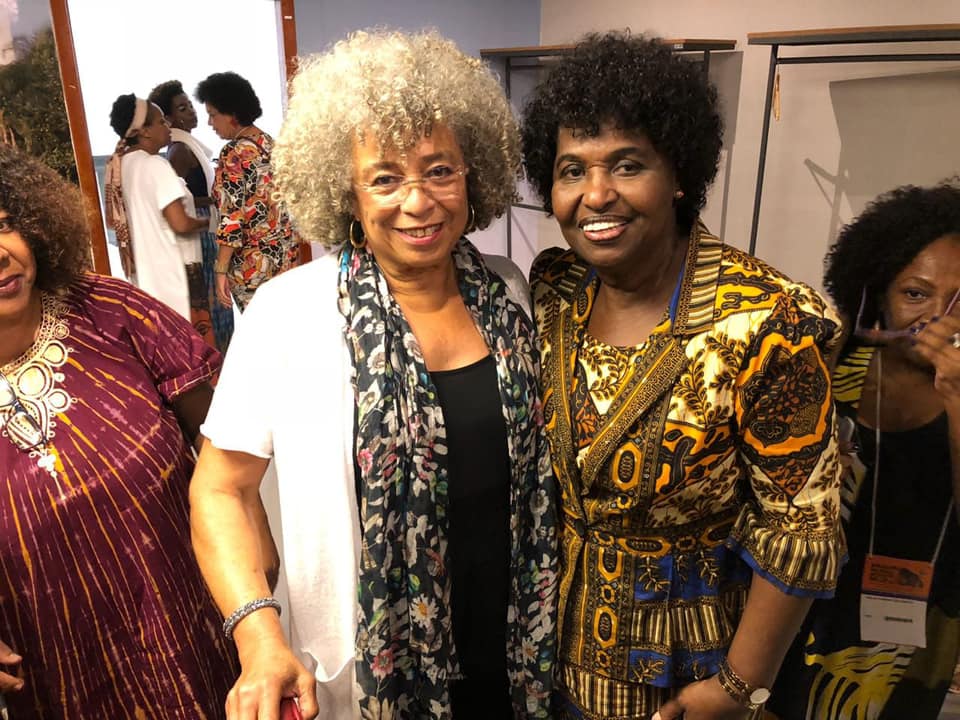
da Silva with her long-time friend Angela Davis
You have been an important actor in the fight against structural racism. You fought for years to guarantee equal labor rights for domestic workers, who were essentially working in slave-like conditions. I remember when I moved to Brazil in 1991, I met domestic workers who lived in their employers’ households full time who were only given half a day off every two weeks and earned half the minimum wage. I also know that you are one of the people who fought the hardest for Brazil’s affirmative action program, which is vastly superior to the system in place in the United States. And now you have managed to win this fight to equalize financing and airtime for Afro-Brazilian candidates. Recognizing the importance of these achievements, what do you think the big challenges are in the anti-racist struggle in Brazil today?
We are living in time in which there are high numbers of murders of of the black population. We have to work a lot on this, including judicially. There is a huge number of unemployed black people living on the streets. We are dying more from Covid due to precarious housing conditions and lack of decent public policies. I can’t tell you which of these is the most important. What I do know is that to fight racism we have to be included because there is this black intelligence of black people and we should occupy the spaces that have power to make decisions about people’s lives. It doesn’t work when the person making these decisions doesn’t understand or even want to understand us. Today, Brazil’s national political system is going down a path towards becoming a slavery regime in the sense that it is removing all labor rights of the workers – not just those of the domestic workers but of the entire working class. They are trying to privatize all of the strategic sectors of our economy and state companies like the post office, Petrobras, Electrobras, Caixa Economico Federal mortgage bank and Banco do Brasil. Day by day they are destroying the ability of Brazil to show that is is a country in development like it was during the Lula and Dilma administrations. All countries go through periods of economic crisis, but today we are seeing the results of the Coup d’Etat that was committed against the nation of Brazil. They deposed President Dilma and lied to everyone that the economy was going to improve. The majority of the working class is black and we are being excluded from everything now. They haven’t actually created anything apart from giving more attention to the banks, to the rich and of selling off our assets. The people who are suffering the most from all this are the people who comprise the majority of the Brazilian population, who are black, and another segment of the population that suffers together with us, that also suffers from discrimination and exclusion – the indigenous population.
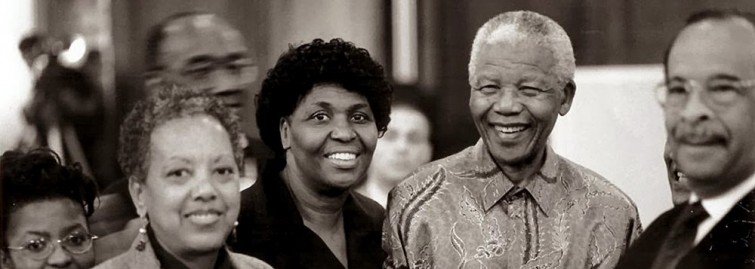
During Nelson Mandela’s 5 day visit to Brazil in 1991
We need to develop a kind of politics that is inclusive. Real economic development will only be possible by including everyone in the process. If you don’t include the majority of the population, how can you call this development? The black population is losing all of the rights that it conquered through its fight, its struggle and through its voting for Lula and Dilma. What we are seeing today is, in fact, impoverishment. We have to invest in the people who need it the most. And the people who need it the most are precisely the black population, through scholarships, access to university study, jobs and labor rights. But unfortunately, the most sophisticated type of slave system project is underway which is led by people with pens in their hands who use fascism. This political project is a fascist exclusion of the people. We are living in a tremendous moment – who are dying the most in this country? This story of the vaccine has become a field of confusion, pranks, screaming ideology and confusion. Who do they want to die? These people who are being excluded. So we know whenever they do bring this vaccine out it won’t be given out in the penitentiaries, which are full of black people. They are the majority of the penitentiary population in our country but they aren’t going there. They also aren’t putting people with special needs into the priority group for vaccinations. What they are doing is a form of cruelty against the poor and black population.
Is there anything else you would like to say?
We are running a campaign to stop them from killing us: Black Lives Matter. This is our big campaign. It is impossible to accept the assassinations that are taking place here. Every week the police are killing another black youth. The police here are unqualified and untrained and the solution the government is offering is to buy them more guns. They just tried to remove the import tax on guns, which is absurd. This is a campaign that we need to keep working on. The constitution stipulates that the state has to protect us equally regardless of race, religious belief or gender. It is important that we join forces internationally in this struggle because they are killing black people in Brazil.
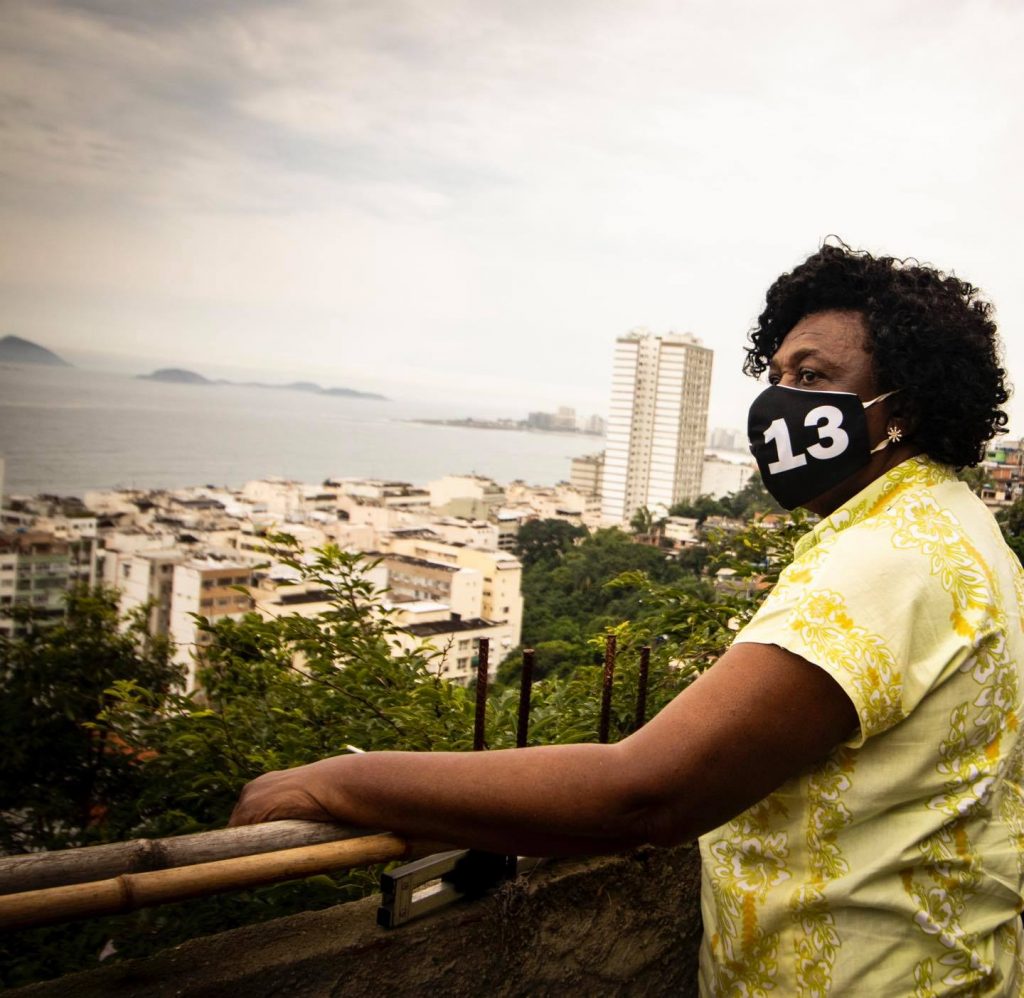
Photos of Congresswoman da Silva taken from her social media pages
[qpp]
